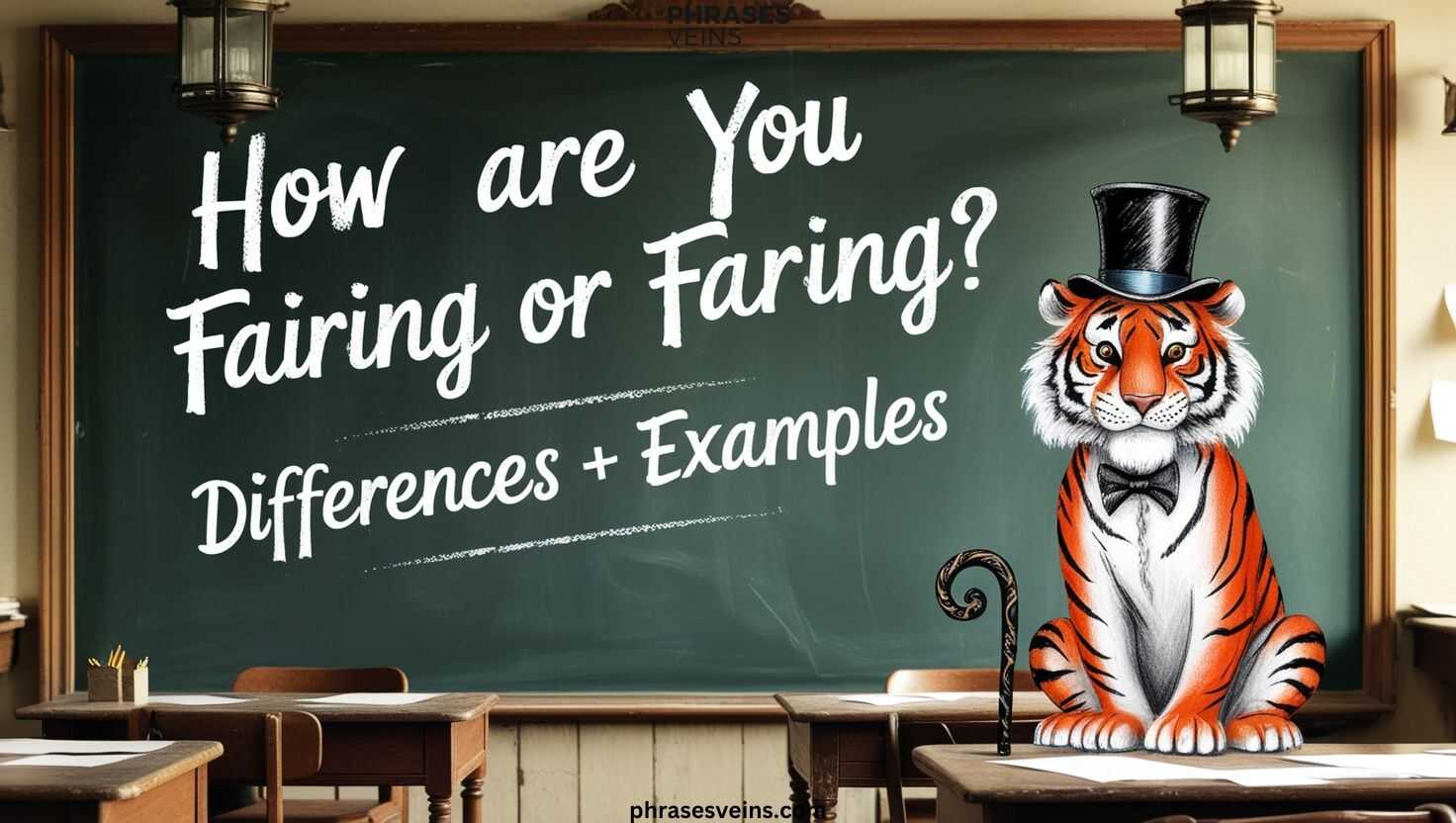English can be tricky, especially when words sound similar but mean different things. The confusion between “how are you fairing” and “how are you faring” is a common issue. Both terms exist in English, but they have completely different meanings and applications. This guide will help you understand their word meanings and applications, clarify contexts, and avoid common usage errors.
Understanding “Fairing”
The word “fairing” has a specific meaning. It refers to a streamlined component on vehicles, airplanes, or bikes designed to reduce air resistance or improve performance. This is related to aerodynamics, where drag reduction is critical. For example:
- “The motorcycle’s fairing was damaged during the accident.”
Examples of Fairing Usage
| Context | Sentence |
|---|---|
| Vehicles | “The plane’s fairing helps with drag reduction.” |
| Motorcycles | “A broken fairing can impact the bike’s design structure.” |
If you’re talking about design structure or a vehicle part, the word “fairing” is the correct choice. It has nothing to do with life progress or personal situations.
Understanding “Faring”
The term “faring” is more about well-being and situational outcomes. It comes from the verb “fare,” which means to manage, cope, or succeed. This is often used in phrases like:
- “How are you faring in these difficult times?”
Here, the speaker is asking about someone’s well-being assessment or progress evaluation.
Examples of Faring Usage
- Situational Handling: “He’s not faring well after losing his job.”
- Performance Evaluation: “How is your team faring in the competition?”
This word is more emotional and personal. It is about life progress and situational handling. Unlike “fairing,” it has no connection to streamlined components or vehicles.
Common Mistakes and Clarifications
Many people confuse “fairing” and “faring” because they sound the same. This leads to language blunders and word mix-ups. Here are a few ways to clarify:
- Use “fairing” for mechanical or vehicle-related contexts.
- Use “faring” when asking about someone’s well-being or personal outcome.
- Think of “fare” as related to a journey or progress.
Common Usage Errors:
- Incorrect: “How are you fairing in your new job?”
- Correct: “How are you faring in your new job?”
Tips for Remembering the Difference
Here are some easy tips to avoid grammar mistakes and usage errors:
- Mnemonic Device: “Fairing is for machines; faring is for people.”
- Association: Link faring with “fare,” which means to manage or succeed.
- Think of fairing as related to aerodynamics and vehicles.
By following these simple tricks, you’ll improve your language precision and avoid mistaken phrases.
Which One is Correct: How Are You Fairing or Faring?
The correct phrase is “How are you faring?” It asks about someone’s well-being or progress. Saying “how are you fairing” is a mistake unless you’re referring to vehicle parts.
Decoding the Variations: “How Are You Fairing” versus “Faring” – Differences and Usage
The phrases “How Are You Fairing” and “How Are You Faring” are often confused due to their similar pronunciation. However, their meanings and uses differ significantly, depending on context. Let’s break it down:
“How Are You Faring”
- Meaning: This phrase is used to inquire about someone’s well-being, progress, or how they’re coping with a situation.
- Usage: It applies to personal outcomes, situational handling, or performance evaluation.
- Example: “How are you faring during the cold weather?”
“How Are You Fairing”
- Meaning: This is typically incorrect when used to ask about well-being. However, fairing refers to a streamlined part in vehicles or aircraft, often used for drag reduction or design improvements.
- Usage: It’s relevant in technical contexts, especially in aerodynamics or engineering.
- Example: “The motorcycle’s fairing improved its speed by reducing air resistance.”
Differences in Usage:
| Phrase | Context | Correct Usage |
|---|---|---|
| “How Are You Faring” | Well-being, progress, coping | “How are you faring with your new job?” |
| “How Are You Fairing” | Vehicle parts, aerodynamics | “The car’s fairing was dented in the crash.” |
READ MORE >>> Verbs That Start With I: Enhance Your Vocabulary 📝✨
Unraveling the Meaning: “How Are You Fairing” or “Faring”? Examples and Clarifications
The phrase you choose depends entirely on what you’re asking or describing:
“Faring” in Everyday Conversations
- Use faring to check someone’s status inquiry, well-being, or situational outcome.
- Example: “How are you faring after the exam?”
- This usage is common in personal and professional contexts.
“Fairing” in Technical Scenarios
- Use fairing when discussing vehicle parts or design structures.
- Example: “The airplane’s fairing was redesigned to reduce drag.”
- It has no connection to asking about someone’s life progress.
Clarifications:
- If you’re talking about a person, faring is the correct term.
- If you’re discussing a physical object, like a vehicle, use fairing.
Decoding the Variations
The confusion between “how are you fairing” and “how are you faring” often arises because the words sound alike but have distinct meanings and contexts. Here’s a deeper dive into their language nuances and how they’re used.
Key Differences Between Fairing and Faring
- Fairing:
- Refers to a streamlined component used to improve aerodynamics in vehicles, planes, or motorcycles.
- Focuses on design structure and drag reduction, not on people or emotions.
- Example: “The airplane’s fairing was replaced after the crash.”
- Faring:
- Describes how someone is managing, coping, or succeeding in a situation.
- Used in personal contexts like asking about well-being or situational outcomes.
- Example: “How are you faring after the new job?”
Fairing vs. Faring
| Aspect | Fairing | Faring |
|---|---|---|
| Definition | A part of a vehicle designed to improve aerodynamics. | Refers to someone’s progress, success, or well-being. |
| Context | Used in mechanical or technical discussions. | Used in personal or situational discussions. |
| Example Sentence | “The bike’s fairing is damaged.” | “How are you faring during the winter?” |
| Common Associations | Vehicles, aerodynamics, design, drag reduction. | Well-being, life progress, coping, performance evaluation. |
| Application | Technical language related to machinery or vehicles. | Conversational or written language about personal outcomes. |
Exploring the Nuances
Let’s explore some context examples to better understand these terms:
- “Fairing” Example: “The airplane’s fairing was replaced to improve its performance.”
- “Faring” Example: “How are you faring after the big move?”
These examples clarify the distinctions between terms and their appropriate usage.
Comparing the Phrases: “How Are You Fairing” or “Faring”? Differences and Real-life Examples
The phrases “How Are You Fairing” and “How Are You Faring” are often confused, but they have entirely different meanings and uses.
- “How Are You Faring” is the correct phrase when asking about someone’s well-being, situational outcome, or life progress. For example:
- “How are you faring with your new job?”
- “How Are You Fairing” is incorrect in this context. However, fairing is used in a technical sense, like in vehicles or aircraft. For instance:
- “The airplane’s fairing was repainted.”
Shedding Light on the Usage: “How Are You Fairing” versus “Faring” – Examples and Explanations
The key difference between fairing and faring lies in their meanings and contexts:
- “Faring” relates to well-being or performance evaluation. Example:
- “How are you faring with your studies?”
- “Fairing” is a streamlined component used in vehicles, often to reduce drag or improve design structure. Example:
- “The bicycle’s fairing reduced wind resistance during the race.”
Why the Confusion?
Both words sound similar, but they serve entirely different purposes. Remember:
- Use faring when referring to people’s well-being or progress.
- Use fairing when discussing mechanical parts.
Mastering the Correct Phrase: “How Are You Fairing” or “Faring”? Differences and Usage Guidelines
To use the correct phrase:
- Always use “faring” when discussing someone’s life progress, situational outcome, or well-being.
- Correct: “How are you faring after the big move?”
- Incorrect: “How are you fairing after the big move?”
- Reserve “fairing” for technical contexts like vehicles or aerodynamics.
- Correct: “The car’s fairing was damaged in the accident.”
- Incorrect: “How is the faring of your life going?”
Usage Tip: Think of faring as tied to feelings and fairing as tied to mechanical parts. By following this simple rule, you’ll always choose the right word for the right context.
20 Points About Using “How Are You Fairing or Faring?”
- Use “faring” when talking about people’s progress.
- Use “fairing” in mechanical contexts.
- Check the sentence context before choosing the word.
- Think of “faring” as related to well-being.
- “Fairing” has no emotional or personal meaning.
- Avoid saying “fairing” unless discussing vehicles.
- “How are you doing?” is a simpler alternative to “how are you faring.”
- “Faring” is used in a status inquiry or performance evaluation.
- “Fairing” relates to aerodynamics and drag reduction.
- Always consider the audience and context.
- Example: “How are you faring after the exam?”
- Example: “The bike’s fairing got damaged.”
- Use “faring” in phrases about personal outcomes.
- Reserve “fairing” for technical discussions.
- Avoid mixing up the two terms in writing.
- Practice using the terms in sample phrases.
- Remember: “Faring” = People, Fairing = Machines.
- Use clear sentence structures to avoid confusion.
- Review the word distinctions to improve language use.
- Focus on expression clarity to improve speaking proficiency.
Frequently Asked Questions
Which is correct, faring or fairing?
The correct term depends on the context. If you’re talking about life progress or someone’s well-being, the word faring is correct. For example:
- “How are you faring with your new responsibilities?”
If you’re referring to a vehicle part that improves aerodynamics or reduces drag, the word fairing is correct. For example:
- “The motorcycle’s fairing was damaged after the accident.”
How are you fairing on?
This phrase is grammatically incorrect. The proper question is “How are you faring on?”, which means asking how someone is managing or coping in a particular situation.
Correct example:
- “How are you faring on with your studies?”
How do you use fairing in a sentence?
Fairing is used in technical or mechanical contexts. Here’s an example:
- “The airplane’s fairing was replaced to improve its aerodynamics.”
It’s not related to personal outcomes or well-being.
How’s your day faring meaning?
This means “How is your day going?” or “How are you doing today?” It’s a casual way to inquire about someone’s situational outcome or progress evaluation during the day.
Example:
- “How’s your day faring so far? Are things going well?”
How to respond to how are you faring?
When someone asks, “How are you faring?”, they’re asking how you’re coping or managing. Respond based on your situation.
Example responses:
- “I’m faring well, thank you!”
- “It’s been tough, but I’m managing.”
What does fairing mean?
Fairing refers to a streamlined component of vehicles or aircraft designed to reduce drag and improve aerodynamics.
Example:
- “The rocket’s fairing protected the payload during its launch.”
It’s a technical term and not used in conversations about well-being or life progress.
Conclusion
Mastering the differences between “how are you fairing” and “how are you faring” can improve your communication clarity and language skills. Always consider the context and use the correct word. Whether you’re talking about streamlined components or someone’s well-being, precision in language matters. So next time someone asks, “How are you faring?” you’ll know exactly what it means and you can answer with confidence!

Welcome to PhrasesVeins, where Arabella Reed brings language to life. With a passion for grammar and phrases, Arabella offers unique insights to help you master language and enhance your expression. Whether you’re a language enthusiast or looking to improve your skills, Arabella’s work guides you through the beauty of words.

